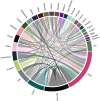From Crisis to Nationalism?: The Conditioned Effects of the COVID-19 Crisis on Neo-nationalism in Europe
- PMID: 40477304
- PMCID: PMC7781420
- DOI: 10.1007/s41111-020-00169-8
From Crisis to Nationalism?: The Conditioned Effects of the COVID-19 Crisis on Neo-nationalism in Europe
Abstract
Will nationalism thrive in times of crisis? A broad segment of scholarly literature has found that a crisis often leads to the resurgence of nationalism. When the coronavirus started to spread rapidly in Europe, individual European nation states unilaterally closed their borders, hoarded critical medical supplies, and played blame games. The early period of the pandemic crisis revealed some hybrid form of medical nationalism, economic nationalism, and everyday nationalism. However, the common crisis has also heightened the importance of regional solidarity, and reinforces a strengthening of cross-national cooperation and multilateral institutions. Based on empirical discussions, this research offers an analytical framework to establish the hypothetic mechanisms of understanding this mixed phenomenon. Delving into the interaction between crisis and nationalism, this article argues that the causation from one to the other is not a linear, one-way process. There are competing mechanisms through which both nationalists and liberalists can use the crisis to push for their political agenda. Whether there will be a new wave of neo-nationalism in Europe is largely contingent on the responses the EU and the member states adopt in handling domestic and regional challenges in the post-pandemic era. Therefore, instead of simply exploring the causal relation between crisis and nationalism, more-nuanced questions can be examined in the future concerning the conditions under which and the mechanisms through which a crisis is more/less likely to provoke neo-nationalism.
Keywords: COVID-19 pandemic; Europe; Far-right parties; Nationalism.
© Fudan University 2021.
Conflict of interest statement
Conflict of interestThe author states that there is no conflict of interest.
Figures
Similar articles
-
COVID-19, nationalism, and the politics of crisis: A scholarly exchange.Nations Natl. 2020 Oct;26(4):807-825. doi: 10.1111/nana.12644. Epub 2020 Jul 19. Nations Natl. 2020. PMID: 32837223 Free PMC article.
-
Crisis Nationalism: To What Degree Is National Partiality Justifiable during a Global Pandemic?Ethical Theory Moral Pract. 2021;24(1):285-300. doi: 10.1007/s10677-021-10160-0. Epub 2021 Feb 14. Ethical Theory Moral Pract. 2021. PMID: 33613085 Free PMC article.
-
The origins, characteristics and trends of neo-nationalism in the 21st century.Int J Anthropol Ethnol. 2022;6(1):18. doi: 10.1186/s41257-022-00079-4. Epub 2022 Dec 8. Int J Anthropol Ethnol. 2022. PMID: 36532330 Free PMC article.
-
Elites and popular nationalism.Br J Sociol. 2002 Sep;53(3):321-41. doi: 10.1080/0007131022000000536. Br J Sociol. 2002. PMID: 12227838 Review.
-
The architecture of the European Union's pandemic preparedness and response policy framework.Eur J Public Health. 2023 Feb 3;33(1):42-48. doi: 10.1093/eurpub/ckac154. Eur J Public Health. 2023. PMID: 36399053 Free PMC article.
References
-
- Anderson, Benedict. 1991. Imagined Communities: Reflections on the Origin and Spread of Nationalism, revised ed. London: Verso.
-
- Barbier-Gauchard, Amélie, Meixing Dai, Claire Mainguy, Jamel Saadaoui, Moïse Sidiropoulos, Isabelle Terraz, and Jamel Trabelsi. 2020. Towards a More Resilient European Union after the COVID-19 Crisis. BETA Working Paper 2020-33. SSRN: https://ssrn.com/abstract=3641306. Accessed 12 July 2020.
-
- Bergmann, Eirikur. 2020. Neo-Nationalism: The Rise of Nativist Populism. London: Palgrave Macmillan.
-
- Bonikowski, Bart. 2016. Nationalism in settled times. Annual Review of Sociology 42 (1): 427–449.
-
- Charney, Evan. 2003. Identity and liberal nationalism. American Political Science Review 97: 295–310.
LinkOut - more resources
Full Text Sources
Research Materials



